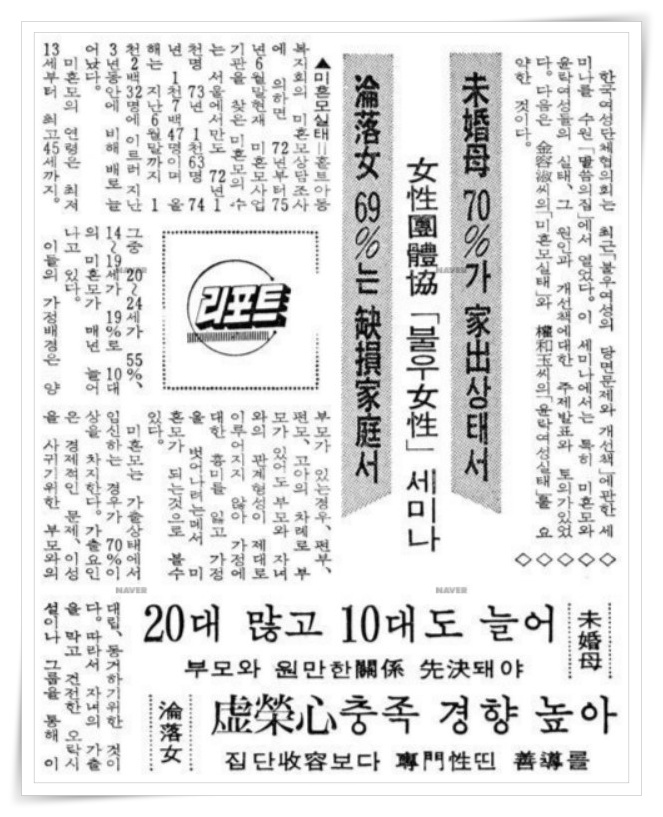- Headline: "Korean National Council of Women (KNCW) 'Disadvantaged Women' Seminar"
- Source: Kyunghyang Shinmun
- Date of Publication: December 3, 1975
- Summary:
The Korean National Council of Women (KNCW) recently held a seminar titled "The Immediate Challenges and Solutions for Disadvantaged Women" at the House of the Word Retreat Center in Suwon. Below is a summary of presentations by Yong-Sook Kim on "The Realities of Unwed Mothers" and Hwa-Ok Kwon on "The Realities of Women in Prostitution."
According to a survey conducted by Holt Children’s Services based on counseling sessions with unwed mothers, the number of unwed mothers seeking their assistance increased steadily from 1,000 in 1972, to 1,063 in 1973, to 1,047 in 1974, and reached 1,232 by June 1975. The age of unwed mothers is increasingly skewed toward teenagers, with over 70% becoming pregnant after running away from home due to family or parental relationship issues. To prevent such incidents, it is essential to create safe spaces where youth can engage in healthy recreation or interact with the opposite sex in a supervised environment. Additionally, stronger parental involvement, enhanced sexual education, and the establishment of counseling centers for low-income working women are urgently needed.
In the case of prostitutes, many originate from broken homes, such as those with step-parents, illegitimacy, or orphanhood. Yong-Sook Kim, who presented the findings on the conditions of unwed mothers, served as the head of the unwed mothers’ counseling division at Holt Children’s Services. In 1975, the Christian Adoption Program of Korea (CAPOK) merged with Holt Children’s Services. Until that time, CAPOK had conducted surveys on unwed mothers who utilized its counseling services, shaping the dominant discourse that unwed mothers were young, poorly educated, and sexually promiscuous. Following the merger, CAPOK faded from public view, with Holt Children’s Services taking its place as the primary institution disseminating these narratives. This article demonstrates that women’s groups also aligned with the discourse on unwed mothers produced by adoption agencies, reinforcing these perceptions.
CLICK the article below to view the original scanned article as it appeared in print, complete with text and images, on the Naver News Library, which archives Korean newspapers from the 1920s to the 1990s. For easier reading, click “텍스트 보기” (View text) in the top right corner to open a text-only window.
Note: Articles are in Korean, and English translations are not provided in the library.  The English summary and translation of this article is provided by UMI4AA.
|
